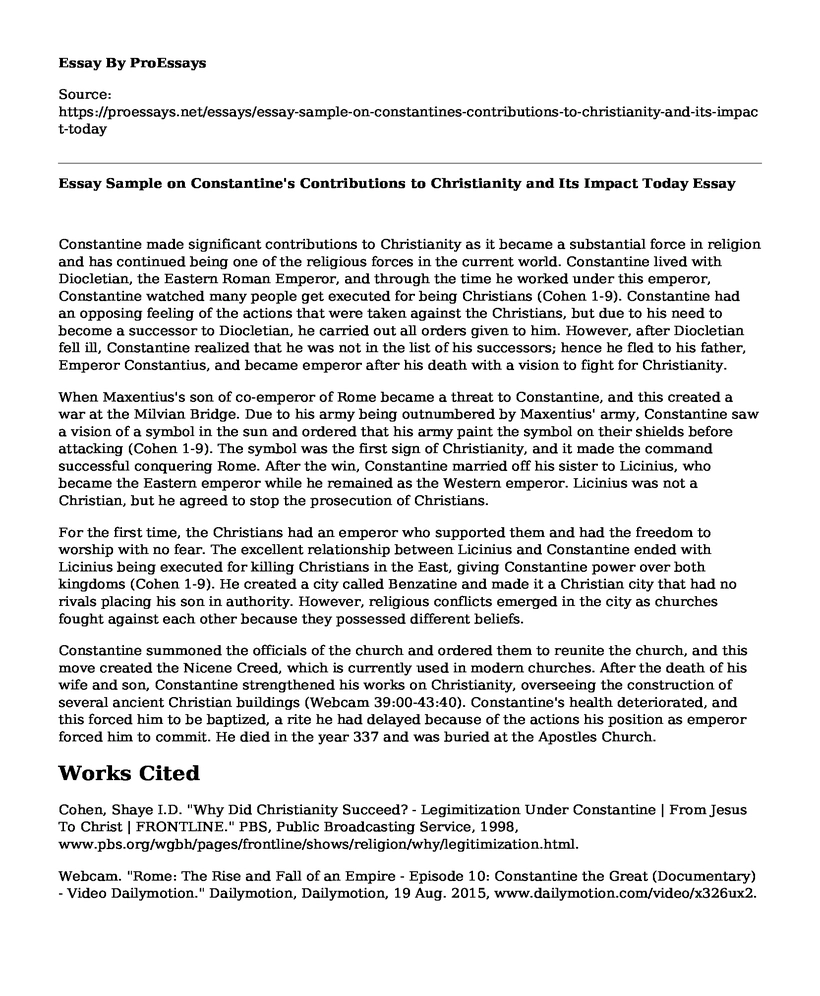Constantine made significant contributions to Christianity as it became a substantial force in religion and has continued being one of the religious forces in the current world. Constantine lived with Diocletian, the Eastern Roman Emperor, and through the time he worked under this emperor, Constantine watched many people get executed for being Christians (Cohen 1-9). Constantine had an opposing feeling of the actions that were taken against the Christians, but due to his need to become a successor to Diocletian, he carried out all orders given to him. However, after Diocletian fell ill, Constantine realized that he was not in the list of his successors; hence he fled to his father, Emperor Constantius, and became emperor after his death with a vision to fight for Christianity.
When Maxentius's son of co-emperor of Rome became a threat to Constantine, and this created a war at the Milvian Bridge. Due to his army being outnumbered by Maxentius' army, Constantine saw a vision of a symbol in the sun and ordered that his army paint the symbol on their shields before attacking (Cohen 1-9). The symbol was the first sign of Christianity, and it made the command successful conquering Rome. After the win, Constantine married off his sister to Licinius, who became the Eastern emperor while he remained as the Western emperor. Licinius was not a Christian, but he agreed to stop the prosecution of Christians.
For the first time, the Christians had an emperor who supported them and had the freedom to worship with no fear. The excellent relationship between Licinius and Constantine ended with Licinius being executed for killing Christians in the East, giving Constantine power over both kingdoms (Cohen 1-9). He created a city called Benzatine and made it a Christian city that had no rivals placing his son in authority. However, religious conflicts emerged in the city as churches fought against each other because they possessed different beliefs.
Constantine summoned the officials of the church and ordered them to reunite the church, and this move created the Nicene Creed, which is currently used in modern churches. After the death of his wife and son, Constantine strengthened his works on Christianity, overseeing the construction of several ancient Christian buildings (Webcam 39:00-43:40). Constantine's health deteriorated, and this forced him to be baptized, a rite he had delayed because of the actions his position as emperor forced him to commit. He died in the year 337 and was buried at the Apostles Church.
Works Cited
Cohen, Shaye I.D. "Why Did Christianity Succeed? - Legimitization Under Constantine | From Jesus To Christ | FRONTLINE." PBS, Public Broadcasting Service, 1998, www.pbs.org/wgbh/pages/frontline/shows/religion/why/legitimization.html.
Webcam. "Rome: The Rise and Fall of an Empire - Episode 10: Constantine the Great (Documentary) - Video Dailymotion." Dailymotion, Dailymotion, 19 Aug. 2015, www.dailymotion.com/video/x326ux2.
Cite this page
Essay Sample on Constantine's Contributions to Christianity and Its Impact Today. (2023, Mar 27). Retrieved from https://proessays.net/essays/essay-sample-on-constantines-contributions-to-christianity-and-its-impact-today
If you are the original author of this essay and no longer wish to have it published on the ProEssays website, please click below to request its removal:
- Including Client Spirituality or Religious Beliefs in Therapy Essay
- Relationship Between the Counsellors and the Clients and Spirituality Paper Example
- Essay Sample on The Decline of Christianity in the Global North: Examining the Role of Modernity
- Essay Example on Countering Jihadi Ideology: A Policy Framework
- Essay Example on Jesus Mission: Teach, Criticize & Sacrifice for Humankind
- Paper Example on Nutrition: A Vital Key to a Healthy Lifestyle
- Brief Summary of Hinduism Essay Example







